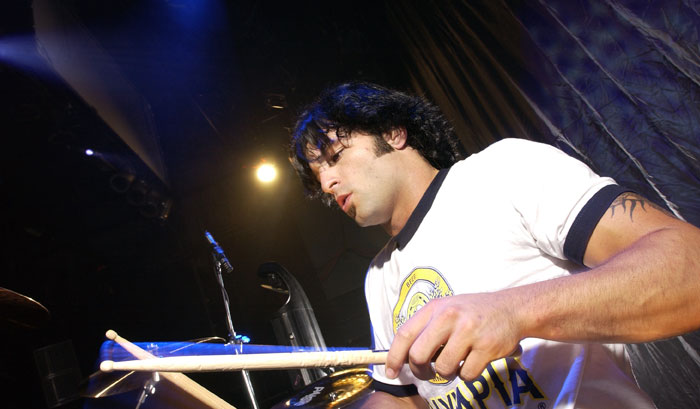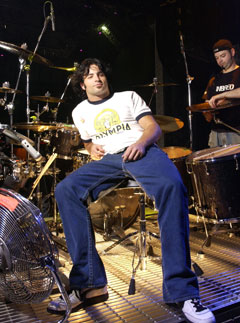


As drummer with the hard rock band Trapt, Aaron Montgomery has been on the road almost nonstop for two years, playing close to 400 shows. All that road conditioning is about to pay off: the band is returning to the studio to cut the follow-up to their self-titled Warner Bros. debut, a platinum-selling smash.
Montgomery grew up in Seattle and came of age during the city's rock explosion. "We had guys like Matt Cameron from Soundgarden, Dave Grohl from Nirvana, and Dave Krusen, who played on Pearl Jam's Ten," recalls Aaron. "I was a middle school student when all those bands were popping. Meanwhile, I was finding my way into drumming through jazz, playing with the school band. But when all those bands started exploding, it leaned my interest toward rock."
Yamaha's birch, maple, and oak drums all sound really good. I'd play them all in a second.
After continuing his music education through college, Aaron temporarily fell out of the rock scene. "I played strictly jazz for years," he says. "I made a living playing cruise ship gigs and whatever else I could scrape together. But by the time I ended up in Miami, I was really missing the rock." He started playing in bands again and eventually relocated to Los Angeles. There he met the other members of Trapt shortly after they had recorded their Warner Bros. disc with drummer Robin Diaz, who was leaving the project.

Montgomery sees no conflict between his jazz and rock sides. "I agree with what Jack DeJohnette called the 'oneness' concept," he reflects. "There's room for all musical styles in any context. It's just a matter of using your musical judgment to discern how to use them in a particular situation. In rock, obviously, you need a strong backbeat with a deep pocket. You need to make people bob their heads and throw their hands in the air. But that's really no different from generating a deep, deep groove in any sort of music."
Aspects of Aaron's jazz past still inform his work with Trapt. "A huge part of my style is based on the triplet, which is the very foundation of swing," he notes. "That applies to my fills, my breaks, and the ways I layer the groove against the predominant meter. Even in rock, a lot of what I do is triplet-based. And that's even truer when I'm playing in meters like 6/8."
Montgomery views the drumming on Trapt as a template to expand upon in concert. "Robin did a great job on the record," he says. "But I was always taught that you should learn what others are doing, then put your own spin on it. My teachers would tell me to listen to greats like Papa Joe Jones, Philly Joe Jones, Tony Williams, and Elvin Jones and get whatever I could from them, then absorb their concepts on a root level and put my own spin on it. And that's pretty much what I've done with Trapt."
Aaron feels this approach has benefited the band. "I think we put more thought into how we create parts and arrangements to support the music overall. Your style of playing is a direct result of who you are as a person. So much has changed with everyone in this band over the last few years, and that's really reflected in how new things are written."
Montgomery plays a sixpiece Yamaha Birch Absolute Nouveau kit. "It's absolutely beautiful," he says. "All the sizes are standard: 10", 12", 16", and 18" toms and a 22" kick. I use two different snare drums: a 14"x7" birch snare and a Paul Leim chrome-over-brass model. I tend to use the chromeover- brass one for outdoor venues, where it seems to project a little better, and I use the birch drum for everything else." He also mounts an electronic kick trigger on the side of the hi-hat, plus a Yamaha TP65S pad to trigger additional sounds.
"I also used a Yamaha oak kit for a long time," adds Aaron. "That's an awesome kit, too, and it sounds amazing in the studio. But my ear just hears more of the rock tone in the birch. It has this punchy quality that's exactly what I'm looking for. It has the right amount of sustain and decay. I've got to say that Yamaha's birch, maple, and oak drums all sound really good. You won't go wrong with any of them, and I'd play them all in a second. Hit any of them, and they sound amazing. Beyond that, it's just semantics."
























